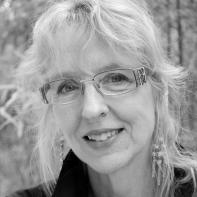Cynthia Hogue

Cynthia Hogue has published seven collections of poetry, most recently, Or Consequence and When the Water Came: Evacuees of Hurricane Katrina, interview-poems and photographs (with Rebecca Ross), both in 2010. She co-translated Fortino Sámano (the overflowing of the poem), by Virginie Lalucq and Jean-Luc Nancy (Omnidawn 2012). Among her honors are an NEA in poetry, the H.D. Fellowship at the Beinecke Library at Yale University, and the Witter Bynner Translation Residency Fellowship at the Santa Fe Art Institute. Hogue is the Maxine and Jonathan Marshall Chair in Modern and Contemporary Poetry in the English Department at ASU.© University of Arizona Poetry Center
Elegy with Window
Arms crossed as in–
dearth of
beating heart—the heart
now cradled (clay):
turn to me you turned like a sunflower toward
light from the window Mother sat by
then you could not oh
you cannot move
or anymore see
someone you loved
seeing YOU passing into that space of
(life)
shifting the negative
ions your absence
generates in not being
Aware of
that desire for
this deliberate attention:
Your daughter leaning to touch
then touching in awkward last embrace
Placing hands
on either side
of your face
The Cayadutta Creek Suite
I spell – Cayudeta –
phonetically:
“Cayadutta” is English
spelling for the Mohawk
“stone standing out of water,”
a boulder in the creek
at the foot of the Adirondacks
moved to build the Erie Canal,
long after the Mohawks themselves
moved (forced). The creek was power
source for the leather mills and
plants growing “like
weeds along its rocky bed”:
tannins used to cure the many hides
to make the gloves of Gloversville
stank. The creek was a gutter.
My high school’s nature club
cleaned a stretch of the Cayadutta
as a class project: tires, a sink,
orange scum all over. Many condoms.
“Those who lived on
the creek commented on
the water’s color based on
what dyes were dumped in.”
*
Smell indelible in memory’s ol-
factories. Like weeds along creek bed.
*
The earth as a site.
Earth in our sights.
*
Release “various gaseous”:
the process by which a
plant whose cell walls
exchange CO2 “by auto-
trophic consumption to produce
O2 is life-
sustaining”: generous
in generation is the earth
of emanative commerce-–
water (as vapor), hydro-
chloride, radium, also
including helium—
these parts of
the planet’s exhalation, photo-
synthesis its inhalation.
We do not produce
oxygen but
release carbon. To
release is not to exchange
but slowly to choke.
I am choking.
*
Living things recognize life, over-
look dying matter, which is dispirited.
*
1920s: Cayadutta sprang clear from Bleecker
Mountain; deadened along its course.
*
1970s: the toll to the creek
the mills took stopped.
Stopped the stench.
The Cayadutta became
“more associated with young
fisherman catching trout” (stocked).
The mills closed and overnight
the county had the state’s lowest
per capita income. No work. No
shops or markets. Downtown died.
That we shopped in dying
stores. That labor was
not local (moved to Philippines).
That I knew the unemployed as
well as owners moving shop to India.
That I thought nothing of that.
My thoughts were stones
standing out of their depth.
That I might now
see through the waters of
the Cayadutta, smell the burdock,
mullein and sweet grass along
its banks means that there are else-
wheres, other plants, and no one atones.
*
Caustic plant, pitcher plant, rubber plant,
sensitive plant, spider plant, woody plant, etc.
On Principle
I asked a Kantian, “Does this mean that, if I don’t give myself
Kant’s Imperative as a law, I am not subject to it?” “No,” I was
told, “you have to give yourself a law, and there is only one law.”
Derek Parfit
Is an act unprincipled
because it’s not subject
to one law? A principle’s
optimistic (the outlawed plan
might not be under-
taken). Also realistic:
it’s will whether to
do or resist doing
something desired,
like a forbidden love,
or deliberated,
as the law allows,
like a necessary killing.
The act could be refused,
an error of ways, erratic
and wayward, the self
lost in the moment of action,
yet at the same time,
fulfilled. In mind,
on the mind, neither
certainty nor satiety.
Who really wants to weather
the way a gobbled meal
holds the body,
hiccups insisting on
presence before the sleep—
inducing tryptophan
of food takes effect,
or believe killing could make us
just, something other
than killers, or bestow a peace
that may cometh at last
because we haven’t done
everything, right or wrong,
we dreamed of, that
arresting ourselves
being in principle a choice,
though we’ll never even
now (say it!) say it?

